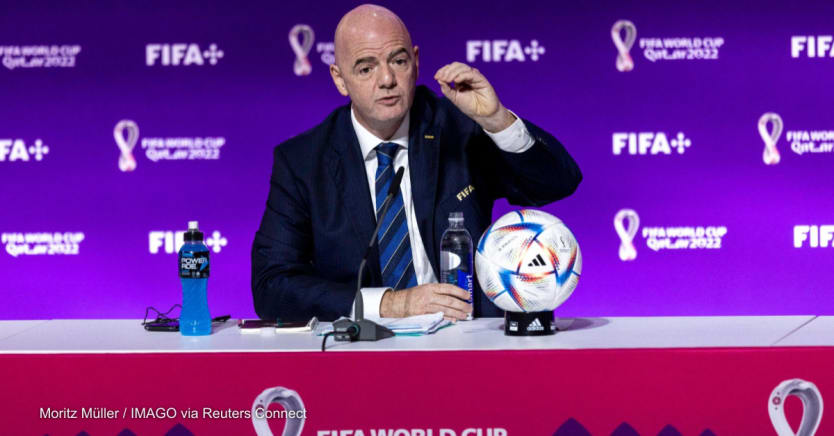
The International Labour Organization is hammering out the details of an agreement with the international soccer governing body FIFA that would see it assess labor conditions in countries hoping to host the World Cup before they are selected.
A draft memorandum of understanding says that ILO would offer its expertise “on the application of international labor standards” while FIFA would provide information “on their engagement on labor issues with organizing country authorities,” according to a senior ILO official.
The memorandum would form the substance of a “labor excellence hub” that FIFA said it was establishing in partnership with ILO.
It follows a scandal over labor rights in the lead-up to the 2022 Qatar World Cup.
FIFA President Gianni Infantino announced the labor excellence hub during a press conference as the tournament kicked off, but so far, details have been scant.
Asked for more information about the hub, FIFA directed Devex to a short press release that stated that “The role of the programmes will be to share best practices in labour matters and support adherence to the United Nations Guiding Principles on Business and Human Rights when hosting FIFA tournaments.” A later release referred to “the celebration of an Memorandum of Understanding” between FIFA and ILO.
However, ILO is still considering the draft memorandum, according to Giovanni di Cola, an ILO special adviser.
“We do not have a formal relationship with FIFA to date,” di Cola told Devex. He said ILO had been approached “only recently” by FIFA’s Infantino to discuss a collaboration and that while discussions had been going on for about six weeks, nothing had been signed.
“Now we are discussing the content of this MoU which … needs to be cleared internally,” di Cola said, noting that ILO has stringent approval processes for partnerships.
The memorandum does not explicitly mention a labor excellence hub, di Cola said. Instead, it says that ILO will offer its “vast body of information, knowledge and database on the application of international labor standards, labor legislation and related mechanisms at the country, regional and global levels, as well as research, training material and methodologies.” Meanwhile FIFA will “exchange information on their engagement on labor issues with organizing country authorities, as well as information [on] good practices across all processes related to football events.”
WHO, ILO warn about health risks of working 55 hours or more per week
In 2016, 398,000 people died from stroke, and 347,000 from heart disease as a result of working such long hours, according to a study by WHO and ILO.
Di Cola said the exchange would see ILO assess labor legislation in countries that are bidding to host FIFA tournaments. It would also provide technical support on request to countries that have already been selected as hosts.
He said it had become clear since the issues in Qatar that labor needs to be addressed as part of the selection and preparation process for World Cup events.
FIFA has been under pressure over media allegations that more than 6,000 migrant workers died during the construction of World Cup infrastructure in Qatar, and that abuses were rife. Qatar denies the claims, saying it recorded only three work-related deaths on World Cup sites between 2014 and 2020, while ILO has fallen somewhere between the two estimates — it says 50 migrant workers died in 2021 alone.
While ILO would not be able to control the host country selections, di Cola said “if we are requested to do [the assessments] … and this is taken into serious consideration well before the bids are selected, I think there could be a positive impact.” He added that the assessments would be made public.
Once countries are selected, ILO could also provide technical assistance on labor reforms.
Despite not having a formal partnership with FIFA, ILO opened a project office in Qatar in 2018 following a complaint that was lodged on behalf of foreign workers in the country. A recent report from ILO said Qatar had introduced “comprehensive” labor reforms in the four years since the office opened, despite ongoing “challenges in implementation.” FIFA has framed these reforms as part of the World Cup legacy.
Asked whether labor standards would be a bigger part of future selection processes, a FIFA spokesperson said: “FIFA has been integrating far-reaching human rights requirements in its bidding processes and hosting requirements since November 2017 … These requirements are widely considered the most elaborate system of this kind.”
